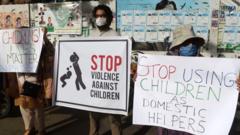With the deadline approaching, Afghan refugees in Pakistan are growing increasingly anxious about their futures after President Trump's recent suspension of U.S. refugee admissions. Human rights organizations warn of potential persecution for those forced to return to Afghanistan.
Pakistan Orders Afghan Refugees to Leave Capital, Heightening Fears of Deportation

Pakistan Orders Afghan Refugees to Leave Capital, Heightening Fears of Deportation
The Pakistani government has announced an ultimatum for tens of thousands of Afghan refugees in Islamabad to relocate by March 31, amid fears of potential deportations to Taliban-ruled Afghanistan.
The Pakistani government has issued a stark ultimatum to the tens of thousands of Afghan refugees residing in its capital, Islamabad, demanding they relocate elsewhere in the country by March 31. This directive comes in the wake of President Trump’s executive order halting refugee admissions to the United States, amplifying the desperation and anxiety faced by those seeking asylum.
Many Afghan refugees fled to Pakistan seeking safety and the prospect of resettlement in Western nations, specifically the U.S., due to their associations with international forces and NGOs during the prolonged conflict in Afghanistan. With embassies and organizations based in Islamabad, the capital has become a hub for these displaced individuals. However, the new relocation mandate aims to exert pressure on Western governments to expedite their acceptance of these refugees.
The Pakistani announcement carries a grave warning for those unable to secure asylum elsewhere: they may be forcibly returned to Afghanistan, under Taliban rule, although the timing of such deportations remains ambiguous. This threat has particularly alarmed the approximately 15,000 Afghan refugees among them who had applied for U.S. resettlement, now left in limbo following the suspension of refugee admissions.
Advocacy groups have decried the U.S. government's actions, labeling the blockade of resettlement as a betrayal of Afghan allies who served alongside American and NATO forces. The situation is fraught with risks; many of the refugees are from vulnerable backgrounds, including minority ethnic groups, women and girls, journalists, and human rights advocates who face the prospect of retribution should they be forced back to Afghanistan.
In response to rising concerns over human rights, the UN refugee agency and the International Organization for Migration have urged Pakistani authorities to consider humanitarian standards when implementing relocation orders. They emphasize the importance of protecting those who are at heightened risk of persecution from the Taliban, advocating for a measured approach to dealing with the complex situation of Afghan refugees in Pakistan.






















